A Greener World's Sustainable Farming Magazine — Spring 2024 — V9 I1
News: Filthy Rich – A wealth of nutrients beneath your feet; Regenerative viticulture; Hosting on-farm events; New AGW label rules Cover feature: Start With The Soil Opinion: Regenerative Is For Everyone Technical: A New Vintage Technical: Get On My Land! Certification News: Labeled For Success Meet the Farmer: Message In A BOTL (BOTL Farm in Ashford, CT)
News: Filthy Rich – A wealth of nutrients beneath your feet; Regenerative viticulture; Hosting on-farm events; New AGW label rules
Cover feature: Start With The Soil
Opinion: Regenerative Is For Everyone
Technical: A New Vintage
Technical: Get On My Land!
Certification News: Labeled For Success
Meet the Farmer: Message In A BOTL (BOTL Farm in Ashford, CT)
Create successful ePaper yourself
Turn your PDF publications into a flip-book with our unique Google optimized e-Paper software.
IN THE NEWS …<br />
FATIDO/ISTOCK<br />
REGENERATIVE BLOOMING<br />
The regenerative agriculture market is forecast to<br />
increase by US$921.18 million over the next four<br />
years, according to a new report from Technavio,<br />
a leading global market research company.<br />
Published in January <strong>2024</strong>, Regenerative<br />
Agriculture Market Analysis reveals that major<br />
global food and beverage companies, such as<br />
General Mills, Nestle SA, Unilever and Danone, are<br />
“increasingly looking to incorporate regenerative<br />
agricultural practices into their supply chains.”<br />
However, the report suggests that widespread<br />
adoption is “hindered by a lack of knowledge<br />
among farmers and consumers alike,” and that<br />
many farmers, particularly in low-income group<br />
areas, “can be resistant to change because of<br />
long-standing practices and a lack of awareness of<br />
regenerative farming.” Similarly, a gap in consumer<br />
awareness “prevents market growth analysis<br />
due to a lack of demand and supply.”<br />
“The growing market presents exciting<br />
opportunities for businesses using our trusted<br />
Certified Regenerative by AGW label,” says Emily<br />
Moose, AGW’s Executive Director. “It’s clear the<br />
regenerative market represents an opportunity<br />
to create real change at scale and to reconnect<br />
food producers and the public in a fair, respectful<br />
and transparent way. But as more agribusiness<br />
corporations jump on the bandwagon to reap<br />
the potential rewards, the need for rigorous,<br />
meaningful verification of responsible regenerative<br />
practices becomes even greater in order to combat<br />
the potential threat of ‘greenwashing’ and ensure<br />
consumer trust going forward.”<br />
Visit technavio.com<br />
CALLS FOR PARADIGM SHIFT<br />
A move to sustainable food systems could bring<br />
US$10 trillion benefits a year, improve human<br />
health and ease the climate crisis.<br />
As reported in The Guardian, a new report<br />
from the Food System Economics Commission<br />
estimates the hidden costs of existing food<br />
systems in terms of climate change, human<br />
health, nutrition and natural resources at<br />
US$15 trillion. Along with the devastating climate<br />
and environmental impacts, the new study<br />
predicts a ‘business-as-usual’ approach would<br />
2023 IN REVIEW<br />
“Our latest annual<br />
review highlights<br />
our activities and<br />
the key successes of<br />
over 6,000 farmers<br />
and ranchers who<br />
we work with,<br />
responsible for<br />
managing more<br />
than 3 million<br />
acres of land<br />
across the world,”<br />
says Katie Amos,<br />
AGW’s Director of<br />
Communications<br />
and Outreach. “We<br />
also explore our key<br />
goals for the next<br />
year<strong>—</strong>and beyond.”<br />
agreenerworld.org/<br />
library<br />
leave 640 million people underweight by 2050,<br />
while obesity would increase by 70%.<br />
The researchers call for a shift of subsidies and<br />
tax incentives away from destructive large-scale<br />
monocultures that rely on fertilizers, pesticides and<br />
forest clearance, towards supporting smallholders<br />
who could turn farms into carbon sinks with<br />
more space for wildlife. The proposed transition<br />
would help to limit global heating to 1.5C above<br />
pre-industrial levels, halve nitrogen run-offs from<br />
agriculture, and eradicate undernutrition by 2050.<br />
RIGHT: WORKING COWS | FAR RIGHT: PEOPLEIMAGES/ISTOCK YEVHENII ORLOV/ISTOCK<br />
GOOD FOOD FINALISTS<br />
Three Certified Animal Welfare Approved by AGW<br />
cheese producers were selected as finalists for the<br />
upcoming <strong>2024</strong> Good Food Awards competition<br />
at a blind tasting held in San Fransisco in mid-<br />
January.<br />
Green Dirt Farm’s Prairie Tomme cheese,<br />
Tomales Farmstead Creamery’s Buona Fortuna<br />
cheese and Liwa cheese, and Working Cows<br />
Dairy’s Rinske’s Farmstead cheese (Rinske de Jong<br />
pictured above) were all selected as finalists for<br />
the highly competitive Cheese category. That is<br />
four AGW-certified cheeses out of the 20 finalists.<br />
The Good Food Awards recognize companies<br />
dedicated to sustainable, delicious, and responsibly<br />
crafted food and drink across the nation. The<br />
judges evaluated over 1,650 products across 18<br />
categories in a blind tasting, selecting 311 finalists.<br />
Winners will be announced on April 29 at the<br />
Good Food Awards Ceremony in Portland, Oregon.<br />
Visit goodfoodfdn.org<br />
FARM PHOTOS<br />
Would you like free<br />
exposure for your<br />
farm and products?<br />
“If you have<br />
any new or favorite<br />
photos of your<br />
animals or farms<br />
and ranches, or<br />
your AGW-certified<br />
products, we invite<br />
you to share them<br />
with us so that we<br />
can help promote<br />
your farm and<br />
brand,” says Callie<br />
Casteel, AGW’s<br />
Marketing Services<br />
Coordinator.<br />
Send to info@<br />
agreenerworld.org<br />
PESTICIDE FOUND IN MAJOR CEREAL BRANDS<br />
A new study has found residues of the plant<br />
growth regulator chlormequat in urine samples<br />
of four out of five Americans.<br />
Published in February <strong>2024</strong> in the Journal<br />
of Exposure Science and Environmental<br />
Epidemiology, the researchers detected the<br />
presence of chlormequat in over 80% of urine<br />
samples taken between 2017 and 2023, and in<br />
92% of well-known oat-based foods purchased<br />
in May 2023, including Cheerios and Quaker<br />
Oats brands.<br />
CALLING FOR EQUITY<br />
A new report has identified over 60 recommendations<br />
to bring more fairness to policies affecting<br />
farming and rural communities in America.<br />
Published by the U.S. Department of<br />
Agriculture Equity Commission, Shaping Change<br />
at USDA is a “comprehensive guide for longlasting<br />
change within USDA programs, policies,<br />
and procedures.”<br />
The recommendations address a range of<br />
long-standing inequity issues, including the care<br />
of farmworkers, the implementation of nutrition<br />
assistance programs, equity access issues for lowinterest<br />
farming loans, increasing the development<br />
of housing, making it easier for farmers to qualify<br />
for conservation programs, and making the<br />
language more accessible.<br />
Download the full report<br />
at usda.gov/equitycommission/reports<br />
Chlormequat is commonly applied to cereal<br />
crops in Canada and Europe to prevent lodging.<br />
Although not currently approved for use on edible<br />
crops in the U.S., treated imported foods are<br />
allowed to enter the country and regulators are<br />
considering approving its use. Chlormequat has<br />
been associated with reduced fertility and harm<br />
to developing fetuses in animal studies. However,<br />
the researchers note that the levels found in study<br />
participants were far lower than maximum safe<br />
residues set by regulators in the U.S. and Europe.<br />
4 • SUSTAINABLE FARMING • SPRING <strong>2024</strong><br />
SPRING <strong>2024</strong> • SUSTAINABLE FARMING • 5




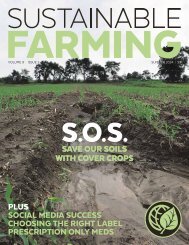
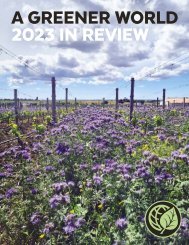
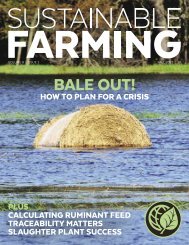
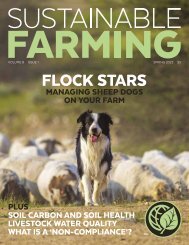
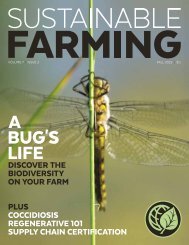
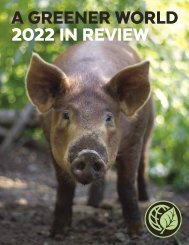
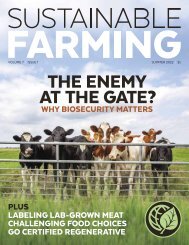
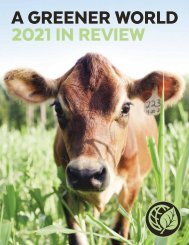
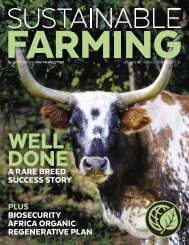




![SF Magazine V5 I1 -- Winter-Spring 2020 [SCREEN ONLY]](https://img.yumpu.com/63122871/1/190x245/sf-magazine-v5-i1-winter-spring-2020-screen-only.jpg?quality=85)